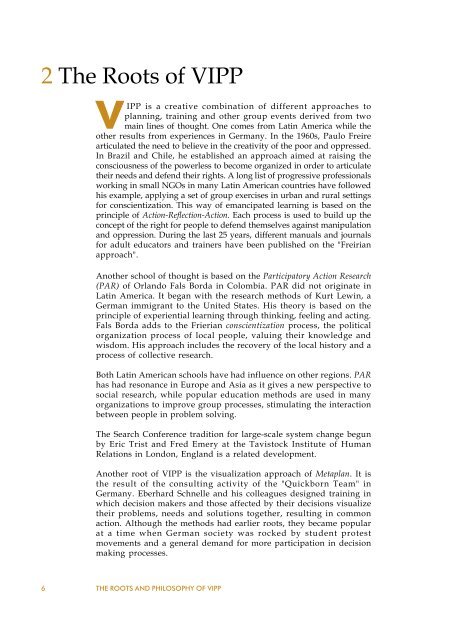VIPP_Unicef
VIPP_Unicef
VIPP_Unicef
Create successful ePaper yourself
Turn your PDF publications into a flip-book with our unique Google optimized e-Paper software.
2 The Roots of <strong>VIPP</strong><br />
6<br />
<strong>VIPP</strong> is a creative combination of different approaches to<br />
planning, training and other group events derived from two<br />
main lines of thought. One comes from Latin America while the<br />
other results from experiences in Germany. In the 1960s, Paulo Freire<br />
articulated the need to believe in the creativity of the poor and oppressed.<br />
In Brazil and Chile, he established an approach aimed at raising the<br />
consciousness of the powerless to become organized in order to articulate<br />
their needs and defend their rights. A long list of progressive professionals<br />
working in small NGOs in many Latin American countries have followed<br />
his example, applying a set of group exercises in urban and rural settings<br />
for conscientization. This way of emancipated learning is based on the<br />
principle of Action-Reflection-Action. Each process is used to build up the<br />
concept of the right for people to defend themselves against manipulation<br />
and oppression. During the last 25 years, different manuals and journals<br />
for adult educators and trainers have been published on the "Freirian<br />
approach".<br />
Another school of thought is based on the Participatory Action Research<br />
(PAR) of Orlando Fals Borda in Colombia. PAR did not originate in<br />
Latin America. It began with the research methods of Kurt Lewin, a<br />
German immigrant to the United States. His theory is based on the<br />
principle of experiential learning through thinking, feeling and acting.<br />
Fals Borda adds to the Frierian conscientization process, the political<br />
organization process of local people, valuing their knowledge and<br />
wisdom. His approach includes the recovery of the local history and a<br />
process of collective research.<br />
Both Latin American schools have had influence on other regions. PAR<br />
has had resonance in Europe and Asia as it gives a new perspective to<br />
social research, while popular education methods are used in many<br />
organizations to improve group processes, stimulating the interaction<br />
between people in problem solving.<br />
The Search Conference tradition for large-scale system change begun<br />
by Eric Trist and Fred Emery at the Tavistock Institute of Human<br />
Relations in London, England is a related development.<br />
Another root of <strong>VIPP</strong> is the visualization approach of Metaplan. It is<br />
the result of the consulting activity of the "Quickborn Team" in<br />
Germany. Eberhard Schnelle and his colleagues designed training in<br />
which decision makers and those affected by their decisions visualize<br />
their problems, needs and solutions together, resulting in common<br />
action. Although the methods had earlier roots, they became popular<br />
at a time when German society was rocked by student protest<br />
movements and a general demand for more participation in decision<br />
making processes.<br />
THE ROOTS AND PHILOSOPHY OF <strong>VIPP</strong>


